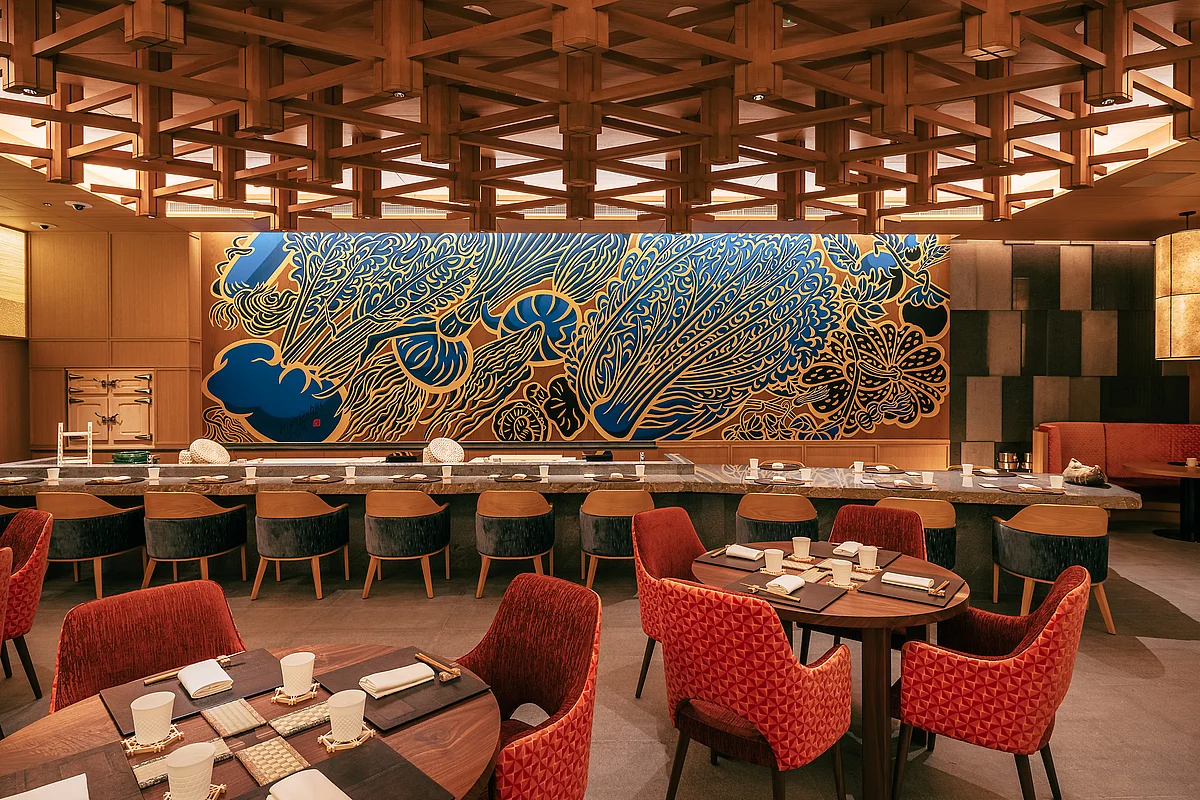
Dubai: Japanese Restaurant Kigo Serves An Edible Opera
I've eaten at Fat Duck, London, at Noma, Copenhagen, at the French Laundry, Napa Valley - and yes, those are theatre, sleight of hand, ideas as food. But this? Kigo is food as devotion. It is discipline with delight. It's the best meal I've had in Dubai, and one of the best I've had anywhere - not just because of the ingredients, but because of the absence of ego. There is no gimmick here. No Instagram-baiting tomfoolery. Just a quiet, ferocious dedication to doing something properly.
There's a particular kind of silence in a very good Japanese restaurant. It's not quiet, per se - not hushed, it's the silence of intent, of ritual, of knives on fish, and rice that has been contemplated longer than some marriages.
Recommended For YouKigo, hidden inside the polished husk of Dubai's DIFC Four Seasons, doesn't so much open as unfold. Step inside and you're not in a restaurant, you're in a haiku - low-lit, clean-lined, and heavy with the aroma of vinegar and charcoal. It feels like Tokyo. Not the neon Tokyo of ramen joints and Lost in Translation, but the serious, sacred Tokyo - where chefs train for 20 years to perfect the slicing of a single fluke.
I haven't been to Tokyo for some time - a regret, like not learning the piano, for example - but Kigo brought it all rushing back. That peculiar blend of asceticism and sensuality, discipline and indulgence. The place is a stage, and the counter the front row to an edible opera.
The chef, a soft-spoken orchestrator with hands like a surgeon and eyes like a hawk, begins not with fish, but with rice. And let me tell you: you think you know rice. You do not know rice. This was rice that had been whispered to, massaged, steeped in red vinegar, and stirred with a bamboo paddle the size of a small surfboard. It shimmered. It sighed. It was the mise en scène.
Then came the wasabi. A green knuckle dragged from the soil after two years and grated - as is only proper - on the rough skin of a shark. This is not showmanship. It's craft. It's obsession. And it's this level of detail that sets Kigo apart from Dubai's other Japanese attempts, many of which are more Nobu-by-numbers than anything resembling real omakase.
What followed was a crescendo of raw genius: a temaki of fatty tuna and takuan, wrapped in nori brushed over hot coals, crowned with a glistening lobe of sea urchin that had, presumably, taken the morning JAL flight from Hokkaido. The sea urchin melted like butter on a radiator. The tuna purred beneath it. It was magnificent.
There were perhaps 15 more courses - who's counting when time no longer applies? - each one explained with monk-like patience by the chef or his acolytes. Nigiri came in flounder, snapper, and an exquisite bonito - flown in to substitute for the absent Spanish mackerel, which was apparently off doing something more important. The barracuda was seared over lava stone from Mount Fuji, which sounds like PR nonsense until you taste it, and realise that's exactly what it needed.
The squid, with a flick of lime and a dusting of salt, was a minimalist painting. A Matisse line drawing of a dish.
Midway through, an otsumami selection arrived: blackfin seabass, yellowtail, a delicate hairy crab with matsutake mushrooms - the sort of combination that sounds like the worst dinner party in Chelsea but tastes like the last supper of a dying emperor. Then came the tilefish - fried with its scales on - a bold move that shouldn't work, but does. The crispness of the scales against the soft underbelly of flesh was, frankly, indecent.
It built and built: more sea urchin, different rices, smoky overtones, murmurs of citrus. The eel came - sugarcane-glazed, sweet and brothy - like a Dickensian dessert crossed with Shogun. And then, the tamago - Japan's answer to crème brûlée, if crème brûlée were made with prawns and precision instead of cream and nostalgia.
Dessert, if you can call it that, was a whisper: perfectly peeled Muscat grapes, a stony, minerally pear, and a matcha tea that tasted like an apology from nature.
It is not cheap. Nor should it be. But it is worthy. And like the name suggests, it will change with the seasons - and I, for one, look forward to winter.
Hero dish: Temaki of fatty tuna and takuan - 10/10
Senses: Overload of smells and tastes - 10/10
Menu curation: Every dish had its own story - 10/10
Service: Informative and discreet - 10/10

Legal Disclaimer:
MENAFN provides the
information “as is” without warranty of any kind. We do not accept
any responsibility or liability for the accuracy, content, images,
videos, licenses, completeness, legality, or reliability of the information
contained in this article. If you have any complaints or copyright
issues related to this article, kindly contact the provider above.


















Comments
No comment